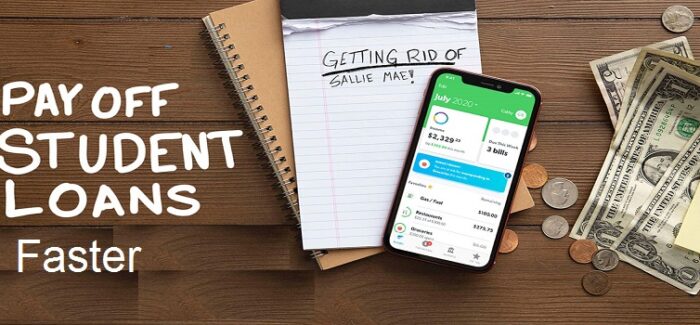
- December 28, 2022
- Mark Elwes
Tips for Paying Off Student Loans Faster
Table of Contents
Paying off student loans is a significant financial goal for many people. You can save on interest or improve your credit score by paying off your student loans as quickly as possible. This blog will discuss tips for paying off student loans faster.
You’ll find ways to make extra payments, refinance, or explore income-driven repayment plans. By following these tips, you can get ahead on your student loan payments and take control of your financial future.
Tips To Pay Off Your Student Loans
1. Make Extra Payments
One of the easiest and most effective ways to pay off student loans faster is to make extra payments whenever possible. By making extra payments on your student loans, you can reduce the overall cost of the loan and pay it off more quickly.
Here are some suggestions for finding extra money to put towards student loan payments:
- Side hustles: Consider taking on a part-time job or starting a side hustle to earn extra income. This can be a great way to generate extra money that you can put towards your student loan payments.
- Cutting expenses: Look for ways to cut expenses and save money. This might involve reducing your monthly bills or cutting back on non-essential expenses.
- Savings: If you have a savings account, consider using some of that money to make extra payments on your student loans. This can be a good way to reduce the overall cost of the loan and pay it off more quickly.
- Taking Specialised loans: If you want to pay off your student loans, you can look into a few different types of loans from direct lenders. There are a lot of these kinds of choices, and this article will have a professional tone. Private student loans, career development loans, and 12-month loans from direct lenders are all popular ways to pay off student loans.
2. Refinance Your Loans
Another way to pay off student loans faster is to consider refinancing. Refinancing involves taking out a new loan to pay off one or more existing loans. When you refinance student loans, you may be able to get a lower interest rate, which can reduce the overall cost of the loan and make it easier to pay off.
Student loan refinancing has pros and cons. Here are some:
Pros:
- Lower interest rate: One of the main benefits of refinancing student loans is the potential to get a lower interest rate. This can significantly reduce the overall cost of the loan and make it easier to pay off.
- Customised repayment plan: When you refinance, you may be able to customise your repayment plan to fit your needs. This can include choosing a different loan term or setting up a repayment schedule that works for you.
Cons:
- Fees: Some lenders charge fees for refinancing student loans, which can add to the overall cost of the loan.
- Loss of benefits: Some student loans include benefits such as loan forgiveness or income-driven repayment plans. By refinancing, you may lose access to these benefits.
When deciding whether to refinance your student loans, it’s essential to consider factors such as the interest rate, loan term, and fees. You should also consider whether refinancing is the right choice for your financial situation.
3. Explore Income-driven Repayment Plans
If you’re struggling to make your student loan payments, exploring income-driven repayment plans can be a good way to get relief. Income-driven repayment plans are designed to make student loan payments more affordable. They do this by basing your monthly payments on your income and family size.
Here are some pros and cons of income-driven repayment plans:
Pros:
- Lower monthly payments: They can significantly reduce your monthly student loan payments. This can make it easier to manage your debt and avoid default.
- Potential for loan forgiveness: It offers loan forgiveness after a certain number of years. This means that any remaining balance on your student loans could be forgiven if you meet certain requirements.
Cons:
- Longer repayment period: Because your monthly payments are based on your income, you may end up paying more in interest over the long term. This is because the loan will take longer to pay off.
- Complex eligibility requirements: Eligibility requirements for income-driven repayment plans can be complex. You may need to provide documentation and update your information regularly to stay enrolled.
4. Consolidate Your Loans
Consolidating student loans involves taking out a new loan to pay off one or more existing loans. This can be a good option if you have multiple student loans with different interest rates and terms.
This can simplify your monthly payments and potentially lower your overall interest rate. Consolidation can be especially beneficial for students with bad credit. This can help them get better interest rates and more favourable loan terms.
There are some pros and cons if you want to consolidate your loans. Here are some:
Pros:
- Simplified monthly payments: By consolidating your student loans, you’ll have just one monthly payment instead of multiple payments to multiple lenders. This can make it easier to manage your debt and stay on top of your payments.
- Potential for lower interest rates: You will be able to get a lower interest rate on your consolidated loan. You can save money on interest over the long term.
- Using Personal Loans: If you have bad credit, you might better get a personal loan to pay off your student loans. Personal loans aren’t tied to your credit score, so you don’t have to have good credit to get one. They are easy to get, and the interest rates are low.
Personal loans for bad credit in the UK can also be used for many different things, like buying a car or paying for your living costs while you’re in school.
Cons:
- Loss of benefits: Some student loans come with benefits such as loan forgiveness or income-driven repayment plans. By consolidating, you may lose access to these benefits.
- Fees: Some lenders charge fees for consolidating student loans, which can add to the overall cost of the loan.
When deciding whether to consolidate your student loans, it’s important to consider factors such as the interest rate, loan term, and fees. You should also consider whether consolidation is the right choice for your financial situation.
If you’re considering consolidation, you may want to talk to a financial advisor or credit counsellor for more information. Direct lender loans, such as personal loans for bad credit in the UK, may also be able to provide consolidation options for students with bad credit.
Overall, consolidation can be a good option if you can simplify your monthly payments and lower your interest rate. But it’s essential to weigh the pros and cons before making a decision.
Conclusion
Paying off your student loans early can have numerous benefits. By making extra payments or considering refinancing or consolidation, you may be able to save money on interest and pay off your student loans more quickly.
This can help you improve your credit score, reduce your overall debt burden, and free up money for other financial goals. By following the tips outlined in this blog, you can take control of your student loan debt and work towards a brighter financial future.

Mark Elwes is the Editor-in-Chief at Extramilefinance. He is a notable member of the content strategy team since his joining in 2017. Driven by his fondness for the finance industry, he has spent years gathering as much knowledge as possible about various financial products that include loans also. Previously, Mark worked as a senior journalist writer with experience in writing blogs and articles.










